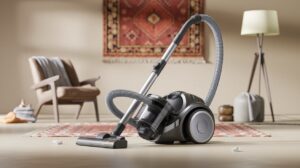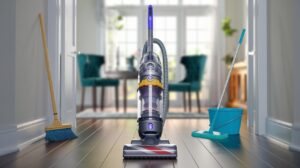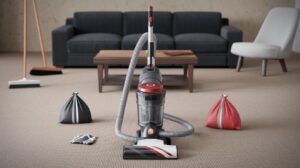The Most Cheapest Vacuums in the World: Are They Worth It?
Introduction
Vacuum cleaners are essential household appliances that make keeping our homes clean and tidy much easier. With so many options available, one of the biggest questions consumers face is whether to invest in a high-end model or choose a cheap vacuum cleaner.
The allure of affordable vacuums is undeniable, especially for those on a budget. But are the cheapest vacuums in the world really worth it?
In this article, we will explore some of the most budget-friendly vacuum options and examine their performance, durability, and overall value for money. We’ll also compare these cheap vacuums to their more expensive counterparts, to see if they can hold their own.
By the end, you’ll have a clearer picture of whether opting for a cheap vacuum is a smart choice without compromising on quality.

Section 1: Understanding the Vacuum Market
When it comes to purchasing a vacuum cleaner, understanding the different types and price ranges is essential. The vacuum market offers a wide array of options, ranging from cheap vacuums to high-end models, each serving different needs. Whether you’re looking for something basic and budget-friendly or willing to splurge for advanced features, it’s important to know what each category offers.
A. Types of Vacuums
Vacuum cleaners come in various types, and each one is designed for different cleaning tasks. Understanding these types will help you determine what works best for your home, especially if you’re considering cheap vacuum options.
- Upright Vacuums: These are the most traditional and popular vacuum types. They are designed for carpet cleaning and often come with powerful suction capabilities. Upright vacuums are great for large spaces, but they can be heavier compared to other models.
- Canister Vacuums: These vacuums feature a canister that holds the motor and dustbin, connected to the nozzle by a hose. Canister vacuums are more versatile, making them suitable for various surfaces, including hard floors and carpets. They are generally lighter than uprights, making them easier to maneuver.
- Stick Vacuums: Known for their lightweight design, stick vacuums are compact and convenient for smaller areas, like apartments or quick cleanups. They often come with limited suction power, but there are still some budget-friendly stick vacuums that offer impressive performance for light tasks.
- Robotic Vacuums: The robotic vacuum is a more advanced option, ideal for people who want their cleaning done automatically. These vacuums are typically pricier, but there are budget-friendly models that work well in smaller spaces.
- Handheld Vacuums: These vacuums are best suited for spot cleaning or small areas. Handheld vacuums are ideal for quick cleanups but typically offer less power than other types.
B. The Pricing Spectrum
The price of a vacuum can vary significantly, depending on the features and type. When looking for a cheap vacuum cleaner, it’s important to understand where these models fall in the overall vacuum price spectrum.
- Low-End Vacuums: This category includes vacuums priced under $100. These are the cheapest vacuums available and often lack advanced features like powerful suction or high-end filtration systems. While these vacuums may not perform as well as more expensive models, they are suitable for light cleaning and smaller homes. If you’re on a tight budget, budget vacuums under $50 can still do a decent job for basic tasks.
- Mid-Range Vacuums: Priced between $100-$300, mid-range vacuums offer a balance between affordability and performance. These models typically have better suction power, more attachments, and better durability compared to cheaper options. Mid-range vacuums are ideal for homes with more cleaning needs, such as those with pets or allergies.
- High-End Vacuums: High-end models, which can cost over $300, come with premium features such as enhanced filtration, advanced suction technology, and specialized attachments. These vacuums are built for durability and can handle heavy cleaning tasks. However, many homeowners find that mid-range or budget vacuums are sufficient for their needs, making high-end vacuums an unnecessary expense for some.
C. What Do You Get with Cheap Vacuums?
When considering cheap vacuums, it’s important to know what to expect. Most budget-friendly vacuums sacrifice some advanced features for lower prices, but they still offer solid cleaning power for light-duty tasks. For example, many low-cost vacuum cleaners are lightweight and compact, making them perfect for quick cleanups in smaller spaces. However, they may struggle with more demanding tasks, like deep cleaning carpets or picking up pet hair.
The key to getting value from a cheap vacuum is knowing what you need. If you just need something to clean light dirt or manage pet hair on hard floors, a budget vacuum might be all you need. But if you need to tackle tough dirt, deep cleaning, or handle multiple surface types, you may need to invest in a more expensive model.
Section 2: The Cheapest Vacuums in the World
When shopping for a vacuum, some consumers may find themselves drawn to the idea of purchasing a cheap vacuum cleaner. After all, who doesn’t want to save money? But before you dive into the world of budget vacuums, it’s important to understand what you’re getting for your money.
A. Popular Cheap Vacuum Brands and Models
There are several brands known for producing low-cost vacuum cleaners that deliver solid performance. These models may lack some of the advanced features of pricier options, but they still get the job done for basic cleaning tasks.
- Bissell CleanView Bagless Vacuum
Price: Around $60
This affordable vacuum offers multi-cyclonic suction and a large dirt cup, which reduces the need for frequent emptying. It’s a popular choice for families looking for a reliable cheap vacuum for everyday cleaning. Despite its affordable price, it provides impressive suction power for the cost. - Eureka NEU182A PowerSpeed Bagless Upright Vacuum Cleaner
Price: Around $70
The Eureka PowerSpeed is a highly rated budget vacuum with strong suction and a wide cleaning path. It’s versatile enough for carpets, hard floors, and upholstery. The large dust cup reduces the need for constant emptying, making it a convenient option for homeowners on a budget. - Hoover ONEPWR Cordless Handheld Vacuum
Price: Around $80
The Hoover ONEPWR is a cordless handheld vacuum that’s perfect for quick cleanups. It’s lightweight, easy to use, and offers decent suction power for a cheap vacuum cleaner. Ideal for smaller spaces or quick spot cleans, this model is a good choice for those who need a portable option. - Black+Decker Cordless Stick Vacuum
Price: Around $50
This stick vacuum is compact, making it ideal for small spaces or apartments. It’s easy to store and comes with a removable dustbin for easy cleaning. Despite its budget-friendly price, it provides reliable suction for light tasks and offers a great balance between affordability and functionality.
B. What to Expect from Cheap Vacuums
While cheap vacuums can provide value for their cost, it’s important to note that they typically come with limitations. Many budget vacuums offer decent suction for smaller spaces but may struggle with heavy dirt, deep carpet cleaning, or pet hair removal. In addition, these models often lack advanced features like HEPA filters or specialized attachments.
Section 3: Pros of Cheap Vacuums
While cheap vacuums may not offer the high-end features of more expensive models, they still have their share of advantages. For those on a budget, a budget vacuum can be a practical solution without compromising on basic cleaning needs. Here are some key benefits of opting for a low-cost vacuum cleaner.
A. Affordability
The most obvious advantage of cheap vacuum cleaners is their affordability. If you’re working with a limited budget, investing in a budget-friendly vacuum can help you maintain a clean home without overspending. Vacuums priced under $100 can still offer good value, especially for homes with smaller spaces or lighter cleaning needs. You’ll get the job done without having to sacrifice essential functions, all while saving money.
B. Lightweight and Easy to Use
Many cheap vacuums are designed with simplicity and ease of use in mind. They tend to be lightweight and compact, making them perfect for quick cleanups or smaller homes. Stick vacuums, for example, are often favored for their portability, as they’re easy to maneuver and store in tight spaces. This convenience is especially useful for people with limited storage or those who don’t want to deal with a heavy, bulky vacuum.
C. Ideal for Small Spaces
If you live in a small apartment or condo, a cheap vacuum might be all you need. Many low-cost vacuum cleaners are perfectly suited for small spaces, offering sufficient suction power for basic cleaning. These vacuums are often easier to store, which is another perk for people living in places with limited closet space. Whether you’re cleaning hardwood floors, rugs, or low-pile carpets, a budget vacuum can handle everyday cleaning tasks efficiently.
D. Sufficient for Light Cleaning Tasks
For light cleaning needs, affordable vacuums can perform just as well as more expensive models. If you don’t have pets or heavy foot traffic in your home, a cheap vacuum can handle quick cleanups with ease. These vacuums work well for collecting dust, crumbs, and other small debris. If your cleaning tasks don’t require deep carpet cleaning or heavy-duty performance, a budget vacuum can still meet your expectations.

Section 4: Cons of Cheap Vacuums
While cheap vacuums can be an attractive option for budget-conscious consumers, there are some drawbacks to consider. Understanding these limitations can help you decide whether a **low-cost vacuum cleaner
** is truly the right choice for your needs.
A. Limited Suction Power
One of the most significant drawbacks of cheap vacuum cleaners is their limited suction power. While these vacuums can handle basic tasks like cleaning hard floors or light rugs, they often struggle with deep-cleaning carpets, removing embedded dirt, or picking up heavy debris. If you have thick carpeting or need a vacuum that can thoroughly clean pet hair, a budget vacuum may not offer the performance you need.
B. Durability Concerns
Another downside of low-cost vacuum cleaners is their durability. While they may work well in the short term, they often don’t last as long as more expensive models. The build quality of cheap vacuums can be lacking, which may result in breakdowns or the need for repairs sooner than expected. Frequent use, especially in homes with pets or heavy traffic, can quickly wear down a budget vacuum. This could mean that you’ll need to replace it more often, ultimately leading to higher costs in the long run.
C. Lack of Advanced Features
Most affordable vacuums come with basic features, which means they often lack advanced technologies found in higher-end models. For example, many cheap vacuums do not include HEPA filters, which are essential for people with allergies or respiratory issues. Advanced features like pet hair attachments, variable suction settings, or bagless technology may be absent, limiting the versatility of these models. While these features can add significant value, they often come with a higher price tag.
D. Smaller Dustbins and More Frequent Emptying
Cheap vacuums typically have smaller dustbins, meaning you’ll need to empty them more frequently. While this might not be a major inconvenience for those with smaller homes or lighter cleaning needs, it can become a hassle if you’re cleaning larger areas or tackling big messes. The frequent need to empty the dustbin can interrupt your cleaning process, reducing the overall convenience of the vacuum.
Section 5: How to Choose the Right Cheap Vacuum
When shopping for a cheap vacuum cleaner, it’s crucial to select one that meets your cleaning needs without sacrificing performance. Not all budget vacuums are created equal, so understanding the features and specifications that matter most can help you make an informed decision.
A. Identify Your Cleaning Needs
The first step in choosing the right cheap vacuum is to identify your specific cleaning needs. Are you cleaning carpets, hardwood floors, or both? Do you have pets that shed fur regularly? If you have multiple surface types, a versatile model may be the best choice. For example, if you’re mainly cleaning hard floors, a stick vacuum or lightweight canister vacuum might suffice. If you need something more powerful for deep carpet cleaning, look for a model with stronger suction power.
B. Consider the Size and Weight
If you live in a smaller space, you’ll likely benefit from a compact vacuum that is easy to store and maneuver. Many cheap vacuums are designed to be lightweight, making them ideal for quick cleanups. However, heavier models may be more powerful, offering better suction for larger homes. Be sure to balance weight with your cleaning requirements.
C. Check the Warranty and Return Policy
Even though you’re purchasing a budget vacuum, you’ll want to ensure that it’s covered by a decent warranty and return policy. Cheap vacuums may have a shorter lifespan than pricier models, so a warranty can offer peace of mind. Look for models with at least a one-year warranty to protect your purchase.
D. Read Reviews and Ratings
Before finalizing your decision, read customer reviews and ratings to gauge the performance and reliability of the vacuum. Reviews can offer insight into how well a cheap vacuum performs in real-world scenarios. If a model consistently receives positive feedback for durability, suction power, and ease of use, it could be a good fit for your home.
Section 6: How Do Cheap Vacuums Compare to Expensive Models?
When deciding between cheap vacuums and more expensive models, it’s important to compare their features, performance, and overall value for money. While high-end vacuums typically offer superior suction power, advanced filtration systems, and added versatility, budget vacuums can still serve your needs well for less.
A. Suction Power
Expensive vacuums often feature advanced suction technology, offering stronger performance for deep cleaning carpets, removing pet hair, and tackling large debris. However, many cheap vacuums can still handle basic tasks like cleaning hard floors or low-pile rugs, though they may not perform as well on thicker carpets. When comparing, consider how much suction power you truly need based on your home’s size and flooring.
B. Features and Attachments
One area where high-end vacuums shine is in the range of features and attachments they offer. Many expensive models include specialized brushes, HEPA filters, and motorized nozzles for pet hair removal. These features make them highly effective for homes with pets or those that require deep cleaning. On the other hand, cheap vacuums typically lack these extra attachments, but they still perform well for basic cleaning needs.
C. Durability
While expensive vacuums are often built to last longer, budget vacuums are more likely to wear out after a few years of heavy use. If you’re willing to replace your vacuum every couple of years, a cheap vacuum might be a viable option. But if you prefer long-term durability, investing in a pricier model could be a better choice in the long run.
D. Overall Value for Money
When comparing cost versus performance, cheap vacuums offer great value for individuals with basic cleaning needs. They may lack the power and extra features of expensive models, but they still provide effective cleaning for most homes. If you’re on a budget, you can get a reliable budget vacuum that meets your needs without overpaying.
Section 7: Are Cheap Vacuums Worth It?
Ultimately, the decision of whether a cheap vacuum cleaner is worth the investment comes down to your specific needs, preferences, and budget.
A. Consider Your Cleaning Requirements
If you only need a vacuum for light cleaning tasks in a small apartment, a low-cost vacuum cleaner could be more than sufficient. For people with minimal carpeted areas or without pets, budget vacuums can provide excellent value. However, if you require advanced filtration for allergies or need a vacuum that can handle heavy cleaning jobs, an expensive vacuum might be a better fit.
B. The Long-Term Perspective
Though cheap vacuums are less expensive upfront, they may not last as long as pricier models. In some cases, you might end up spending more in the long run if you have to replace the vacuum frequently. However, if you only need a vacuum for light, occasional use, a budget vacuum can still deliver solid performance and avoid the hefty price tag of a premium model.
C. Finding the Balance
If you want a vacuum that offers both affordability and performance, look for mid-range models that strike a balance between price and quality. These vacuums often provide better suction and more advanced features without the high cost of premium models.

Conclusion
In the world of vacuum cleaners, cheap vacuums can be a great solution for those on a budget. While they may not offer the high-end features or durability of higher-end models, they can still provide reliable performance for basic cleaning tasks. By carefully considering your needs, reading reviews, and understanding the pros and cons, you can make an informed decision about whether a budget vacuum is right for you. Whether you’re cleaning a small apartment or doing light touch-ups in your home, a cheap vacuum cleaner can be a practical and cost-effective choice.